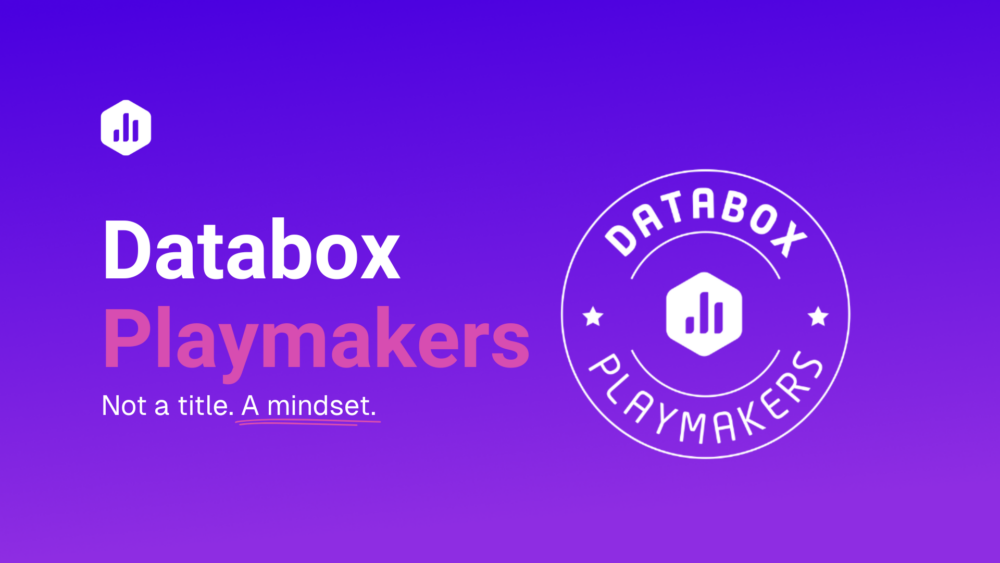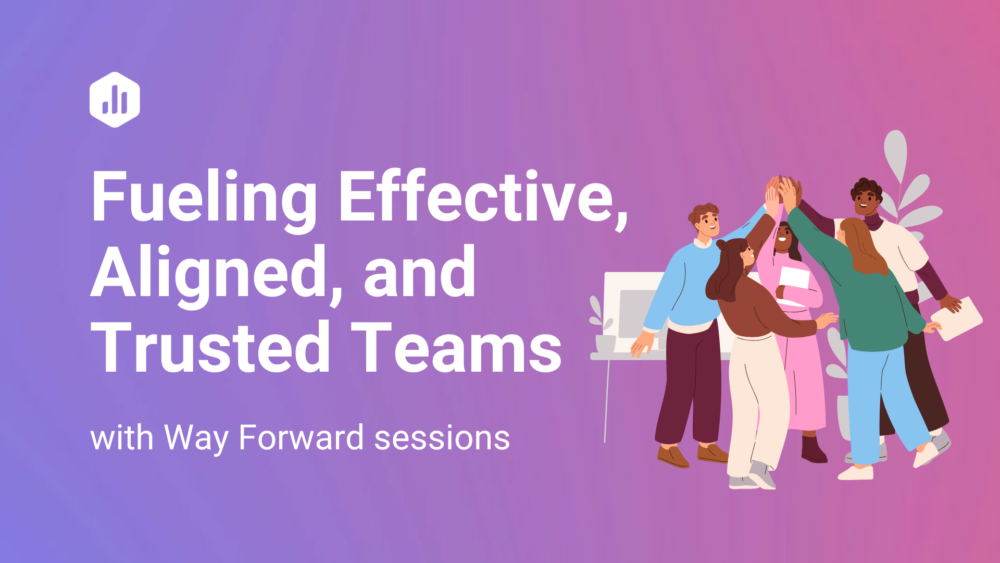Table of contents
In the fast-paced world of business, where skills and knowledge are the currency of success, organizations are continually seeking innovative ways to empower their teams. Embracing continuous learning and professional development has become a strategic imperative, and a powerful yet often overlooked tool within our reach are books. Beyond entertainment, books possess the transformative ability to ignite inspiration, spark creativity, and cultivate essential competencies and skills.
Leveraging books as a catalyst for team development, the Databox Book Club stands as a model for success. In this blog, we unveil the invaluable lessons we’ve learned and the impact our Book Club has had on both our team members and corporate culture. By sharing our experiences, we hope to inspire other organizations to harness the transformative power of reading and foster a culture of continuous growth and empowerment.

How the Databox Book Club Works
At Databox, we believe in the power of purposeful reading, where each book serves as a stepping stone to building competencies and skills within our team. With this belief, we have created our Databox Book Club to not only encourage the habit of reading but also to harness new learnings and cultivate a culture of personal and team development.
Building competencies and skills through books
Firstly, to provide our team with a diverse range of valuable resources, we set aside a book budget of up to $150 per year. This budget caters to two key areas: business-related books that build our professional knowledge and personal development books that nurture growth beyond the workplace. Secondly, we also curated the Databox Book List, which covers various categories, from business and mindset to personal finance and health, fostering continuous exploration and self-improvement.
Because learning is not an occasional event but an integral part of our corporate culture, we sustain it by holding regular club meetings. Our Book of the Month initiative brings the team together to read and discuss a chosen book. These discussions spark engaging debates and collective growth, contributing to our cohesive team environment.
When selecting books, we consider our company values and core competencies and select reads that represent a meaningful step in our team’s growth journey. For instance, “Atomic Habits” by James Clear left a profound impact on our team, instilling the power of building small habits for significant transformations and reinforcing discipline and self-improvement.
Creating a Collaborative Environment
Reading a book in isolation only scratches the surface of its potential. In recent months, we have revamped our meetings to make them more inclusive and engaging. We now start with a lightning talk, where critical points from the book are summarized, followed by a group workshop putting the fundamental principles of the book into practice.
Through these knowledge-sharing workshops, team members not only gain a deeper understanding of the book’s concepts but also discover practical applications that positively impact their day-to-day work. The exchange of ideas and experiences has strengthened the bonds among our team, creating a collaborative atmosphere that transcends departmental boundaries and fosters a sense of unity and camaraderie within our organization.
Making the Book Club Accessible to All
With team members spread across different locations and working arrangements, it was crucial to allow everyone to engage in the Book Club’s activities. Our commitment to inclusivity extends to our Book Club, so we strive to ensure that every team member, regardless of their role or location, can actively participate and benefit from the club’s offerings.
By moving our discussions online, we ensure all team members can engage actively in the experience. Additionally, by sharing all the slide decks, recordings, and additional resources on our Book Club Confluence page, we ensure that all team members can engage actively in the experience, benefit from the main takeaways and contribute to the discussions, even if they weren’t able to finish the book.

A Blueprint for Success: How to Structure a Book Club
When embarking on an initiative like the Book Club, having a clear objective and purpose is paramount. It creates a foundation for a culture of learning and development within the organization. Additionally, creating a content plan for at least a few months ahead ensures a steady flow of engaging reads that resonate with team members.
However, it’s essential to recognize that things may not always go as planned. Flexibility is vital, allowing you to review and optimize the Book Club’s format over time. As we share our blueprint, we hope to inspire other organizations to establish similar initiatives.
Step 1: Define Objectives and Competencies
Start by aligning the Book Club’s objectives with your company values and strategic goals. Identify the core competencies and skills crucial for your team’s success.
Step 2: Curate a Diverse Reading List
Involve the team in the book selection process to curate a diverse reading list that covers various topics and perspectives. Ensure each book reinforces the competencies and skills you aim to develop.
Step 3: Organize Engaging Knowledge-Sharing Workshops
Encourage active participation in knowledge-sharing workshops. Create a safe and inclusive environment where team members can freely express their thoughts and ideas.
Step 4: Establish Meeting Frequency and Sustainability
Set a consistent meeting schedule to maintain the culture of continuous learning. Regularly engage in book discussions to sustain the momentum of growth and development.
Step 5: Foster Inclusivity and Accessibility
Ensure the Book Club is accessible to all team members, regardless of location or role. Provide a book budget, digital summaries of selected books, and offer remote participation options to promote inclusivity.

The Big Challenge: Engaging the Team
Introducing a development initiative like the Book Club is just the beginning; the real challenge lies in actively engaging team members in this journey of personal growth. In the fast-paced world of today, with work and family obligations demanding our attention, it’s easy to overlook the significance of investing in ourselves. Recognizing that the desire for personal development is subjective and unique to each individual, we understand the importance of connecting these development activities to their personal development plans.
To ensure the success and adoption of our Book Club, we have taken strategic steps to link this initiative with the individual growth aspirations of our team members. Managers are pivotal in promoting the Book Club and encouraging their team members to participate actively. By aligning the Book Club’s topics with areas in our team member’s personal development plans, we demonstrate its value and relevance to each individual’s career path, making it a seamless and integral part of their growth journey.
We have also established a dedicated Slack channel (#book-club) exclusively for our bookworms. We use it to announce upcoming reads and share summaries, videos, insights, and recommendations from the books we read.
In general, promoting initiatives like this requires us to act as an internal marketing team, showcasing the initiative’s benefits, its alignment with company goals, and its relevance to each member’s professional and personal growth. Regular communication through various channels, including team meetings, newsletters, and even informal chats, ensures our team members stay informed and excited about upcoming book discussions and workshops.


How to Run Engaging Book Debates and Workshops: The Databox Book Club Format
By following this format, the Databox Book Club ensures that workshops are engaging, insightful, and aligned with the objectives of enhancing competencies and skills.
Here’s how we do it:
Prepare the Book Summary as a Lightning Talk:
- Slide 1: Short Book Summary
- Slide 2: Key Points and Principles
- Slide 3: Benefits of the Book
- Slide 4: Call to Action – Links to Book, Author, and Additional Resources
- Slide 5: Short Summary Video as an Introduction to the Workshop’s Principles
Define Workshop Goal and Objective:
- Slide 6: Clearly Define the Goal and Objective of the Workshop
Prepare Guidelines for Workshop and Scenarios:
- Slide 7: Provide Guidelines for the Workshop’s Interactive Session and Assign Scenarios to Groups
Run the Workshop:
- Participants Split into Groups for 15-Minute Workshop Sessions
- Each Group Discusses Assigned Scenarios Based on Book Principles
Debate the Outcomes of the Workshop:
- Each Group Presents Their Findings and Insights from the Workshop
- Engage in a Collaborative Debate and Reflection on the Book’s Application to Real-World Scenarios
Share the Workshop Action Items
- Summarize the learnings and action items from the workshop and share the final product as a list, table, or images with the entire team
Real-life example:
A remarkable outcome of our knowledge-sharing workshop on Mindset by Carol S. Dweck was a group writing with tips on cultivating a growth mindset in various work scenarios. During the workshop, team members from different departments came together to discuss how they could apply the growth mindset principles to their specific roles.
For instance, our sales team shared invaluable tips on bouncing back after facing setbacks or failures. They emphasized the importance of reframing challenges as learning opportunities, embracing feedback as a chance for improvement, and persisting through adversity with a positive outlook. These insights were then compiled into a group writing that has become a valuable resource for our organization.
This is a testament to the power of knowledge sharing and collaboration within our Book Club. By pooling our diverse perspectives and experiences, we have created a treasure trove of practical strategies for embracing challenges, learning from failures, and fostering a growth-oriented mindset across all aspects of our work.

Books we read so far
Recently, our Book Club celebrated its 1st anniversary, prompting a moment of reflection. As we looked back on our journey, we were thrilled to see the collection of books we explored together – covering different areas, from mindset and health to relationships and time management.
These are some of the reads from our checklist that can serve as valuable ideas for your organization or team’s reading list.
| “Atomic Habits” by James Clear – Key Competencies and Skills Reinforced: Goal-setting, Habit Formation, Self-Discipline. – Impact on Team Collaboration and Communication: Improved accountability and shared understanding of setting and achieving goals. “How to Win Friends and Influence People” by Dale Carnegie – Key Competencies and Skills Reinforced: Effective Communication, Relationship Building, Emotional Intelligence. – Impact on Team Collaboration and Communication: Strengthened interpersonal skills, fostering a more collaborative and harmonious team dynamic. “Deep Work” by Cal Newport – Key Competencies and Skills Reinforced: Focus, Time Management, Productivity. – Impact on Team Collaboration and Communication: Encouraged a culture of deep focus and reduced distractions, leading to more efficient teamwork. “Thinking, Fast and Slow” by Daniel Kahneman – Key Competencies and Skills Reinforced: Critical Thinking, Decision-Making, Cognitive Bias Awareness. – Impact on Team Collaboration and Communication: Enhanced analytical skills, enabling more thoughtful and well-informed team discussions. “Leading Without Authority” by Keith Ferrazzi – Key Competencies and Skills Reinforced: Influence, Collaboration, Empowerment. – Impact on Team Collaboration and Communication: Encouraged a more inclusive leadership approach, empowering team members to take initiative. “The Subtle Art of Not Giving a F***” by Mark Manson – Key Competencies and Skills Reinforced: Resilience, Stress Management, Emotional Well-being. – Impact on Team Collaboration and Communication: Fostering a supportive environment and encouraging open discussions about challenges and mental health. “The Mountain Is You” by Brianna Wiest – Key Competencies and Skills Reinforced: Self-Awareness, Emotional Intelligence, Growth Mindset. – Impact on Team Collaboration and Communication: Enhanced empathy and understanding among team members, leading to more compassionate interactions. “Sleep Smarter” by Shawn Stevenson – Key Competencies and Skills Reinforced: Work-Life Balance, Health Management, Productivity. – Impact on Team Collaboration and Communication: Promoted a culture of well-being, leading to increased productivity and engagement. “Breath” by James Nestor – Key Competencies and Skills Reinforced: Stress Reduction, Mindfulness, Resilience. Impact on Team Collaboration and Communication: Introduced mindfulness practices to improve focus and team well-being. “Mindset” by Carol S. Dweck – Key Competencies and Skills Reinforced: Growth Mindset, Learning Agility, Continuous Improvement. – Impact on Team Collaboration and Communication: Encouraged a culture of embracing challenges and learning from failures, promoting a growth-oriented mindset. “Super Thinking” by Gabriel Weinberg and Lauren McCann – Key Competencies and Skills Reinforced: Problem-Solving, Critical Thinking, Mental Models. – Impact on Team Collaboration and Communication: Equipped team members with powerful mental tools to approach complex problems and make more informed decisions collectively. |

Cultivating High Performance: A Synergy of Company Initiatives and Personal Accountability
In conclusion, the Book Club format is a shining example of how companies can proactively foster team and individual development. With a keen focus on topics closely related to the competencies employees seek to build within their career development plans, the Book Club aligns learning with our strategic goals, creating a powerful synergy between individual growth and organizational success.
However, while company-driven initiatives lay the foundation for growth, personal accountability is equally crucial. Each team member holds the key to unlocking their potential by recognizing the development opportunities and actively engaging in such initiatives. By embracing this dual perspective, we cultivate a high-performance culture where continuous learning becomes an inherent part of our collective identity.













